|
|
|
Sort Order |
|
|
|
Items / Page
|
|
|
|
|
|
|
| Srl | Item |
| 1 |
ID:
071463
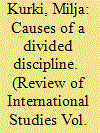

|
|
|
| 2 |
ID:
137087


|
|
|
|
|
| Summary/Abstract |
This piece examines the substance of EU democracy promotion from a comparative point of view and from a perspective placing under inquiry the meaning of the idea of liberal democracy itself. Instead of assuming that the democratic ideal that the EU promotes (‘liberal democracy’) has a clear, fixed meaning, the article examines in detail what actually constitutes the ‘ideal of democracy’ at the heart of EU democracy promotion, and compares this vision to that which informs the democracy promotion of the US. It argues that interesting differences, and shifts and oscillations, in the models of liberal democracy that the EU and the US promote exist and that these are important to note in order for us to fully appreciate how the substance of EU and US democracy support can be shaped by conceptual and ideological debate on the meaning of democracy. This dynamic is particularly relevant today, in the context of the recent attempts to develop transatlantic dialogue on democracy support. This dialogue, it is suggested, plasters over some subtle but important ideological cracks over what is meant by democracy in EU and US democracy support.
|
|
|
|
|
|
|
|
|
|
|
|
|
|
|
|
| 3 |
ID:
099137
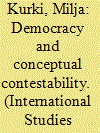

|
|
|
|
|
| Publication |
2010.
|
| Summary/Abstract |
Democracy is a deeply contested concept: historically, complex debates have revolved around the meaning of democracy and the plausibility of different 'models of democracy.' However, democracy's conceptual contestability has received diminished attention in the post-Cold War democracy promotion debate as the attention of democracy promotion actors and scholars has turned to fine-tuning of policies through which a liberal democratic model can be successfully encouraged. It is argued here that the focus on the extension of the reach of the liberal democratic mode of governance has resulted in a conceptually impoverished appreciation of the multiple meanings that the idea of democracy can take. It is argued that the 'essential contestability' of the idea of democracy is not adequately recognized and tackled, which in turn has important effects for the ability of democracy promotion scholars, as well as practitioners, to take into account the consequences that considering alternative (non- or extra-liberal) models of democracy might have for democracy promotion. To move the debate forward, I explore here, primarily in conceptual and theoretical terms, what serious engagement with the essential contestability of democracy might mean for democracy promotion. I argue that it entails a two-fold move: 'pluralization' and 'contextualization' of the conceptions of democracy. The latter part of the article examines in detail the reasons that might exist for considering such a move in framing the study and the practice of democracy promotion, as well as the potential dangers that might be involved.
|
|
|
|
|
|
|
|
|
|
|
|
|
|
|
|
| 4 |
ID:
175164
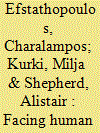

|
|
|
|
|
| Summary/Abstract |
Communities on the planet are faced with complex challenges: changing relations within and between human communities, changing relations with ecological and climatic conditions, and shifts in technology-human interconnections. The complex interconnections across issue areas – migration, environmental degradation and new technologies, for example – demand that scholars increasingly think across theories, paradigms, specialisms and disciplines. But how should we ‘hold things together’ as we try to make sense of complex realities in International Relations (IR)? This introductory article to the Special Issue ‘Facing human interconnections: thinking International Relations into the future’ discusses the open thematic of ‘human interconnections’ that is used to loosely structure the contributions. Analysis of human interconnections, as understood here, does not have a precise or fixed definition but is considered an open-ended notion with varied meanings and dimensions. Indeed, the authors engage it here in varied ways to explore their empirical, theoretical and political concerns. Yet, this notion also allows for interesting new questions to be posed on the potential and limits of IR as it faces the future, and debates around how we see interconnections between issue areas and ‘-isms’, how IR constructs ‘humans’ or ‘non-humans’ in interconnections, and what is at stake in bringing to our attention unacknowledged interconnections. Here we set out why human interconnection is an interesting notion to work with and why we need to keep its meaning open-ended. We also provide an account of six different orientations we observe amongst the authors tackling the dynamics of human interconnections in this Special Issue.
|
|
|
|
|
|
|
|
|
|
|
|
|
|
|
|
| 5 |
ID:
109461


|
|
|
|
|
| Publication |
2011.
|
| Summary/Abstract |
The European Instrument for Democracy and Human Rights (EIDHR) is often considered the "jewel in the crown" of the European Union's democracy promotion. Its mandate encompasses the funding of democratizing civil society organizations and thus the facilitation of democratization "from below." It is argued here that if we apply Foucauldian governmentality tools to the analysis of the workings of the EIDHR, we can see that, despite the pluralistic rhetoric that guides it, the Instrument's objectives and management structures facilitate particular kinds of democratic visions. Neoliberal governmentality, it is argued, may be hidden deep within the expectations set for EU-funded civil society "democratizers." This has important consequences for how we understand the model of democracy that the European Union promotes and the power relations of the European Union's "locally owned" democracy promotion.
|
|
|
|
|
|
|
|
|
|
|
|
|
|
|
|
| 6 |
ID:
098461
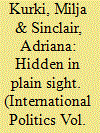

|
|
|
|
|
| Publication |
2010.
|
| Summary/Abstract |
This article argues that constructivism in International Relations (IR) suffers from certain important shortcomings in its analysis of the idea of social context. Specifically it is argued that constructivists fail to adequately engage with 'social structural' forces in world politics. While constructivists have pitched themselves as theorists who aim to account for the role of social context in world political inquiry, their conceptual focus on ideational factors - rules, norms and inter-subjective beliefs - has resulted in an inadequate, or incomplete, conceptualisation of social structure. Constructivists, it is argued here, tend to leave the role of materially embodied social structures theoretically and empirically unexplored. The limitations of constructivist treatments of social context have significant consequences for their analysis of world politics, for example, for recent constructivist attempts to deal with international law. Constructivist interventions into analysis of law remain deficient in important senses because of their failure to conceive of international law in social structural terms and because of their inability to explore in depth law's relationship with other social structures, such as patriarchy or capitalism. This entails that the structured systems of inequality and hierarchy embodied in law fail to be adequately recognised. Recognising the 'incompleteness' of the constructivist accounts of social context, we argue, is important in highlighting the often un-noted limitations of constructivist scholarship and in potentially redirecting constructivist scholarship towards closer engagement with 'critical theory' investigations into IR and law.
|
|
|
|
|
|
|
|
|
|
|
|
|
|
|
|
| 7 |
ID:
108094
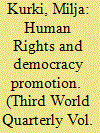

|
|
|
|
|
| Publication |
2011.
|
| Summary/Abstract |
This contribution seeks to engender more nuanced reflection on the role of human rights advocacy and specifically its role in democracy promotion. The two agendas have been seen as conjoined and harmonious by most aid donors; yet, interestingly and perceptively, some commentators have recently criticised the notion that they are agendas that are straightforwardly compatible or coherent. I examine here from a theoretical perspective the plausibility and the consequences of the claim that the two agendas share a more complex and controversial relationship than is often assumed. Specifically, I seek to highlight the importance of paying attention to the possibility that rights themselves are inherently 'contradictory' in nature and that therein lies their contribution to the democratisation agenda. Indeed, by drawing on Samuel Bowles's and Herbert Gintis's view of rights claims as 'clashing' and 'politico-economically' grounded, the aim of this article is to argue for a more politicised and openly contradiction-accepting approach to rights and democracy promotion. I contextualise this (theoretically motivated but practically consequential) argument in the context of the EU's human rights and democracy promotion policies.
|
|
|
|
|
|
|
|
|
|
|
|
|
|
|
|
| 8 |
ID:
075555
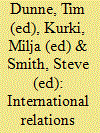

|
|
|
|
|
| Publication |
Oxford, Oxford University Press, 2007.
|
| Description |
xxii, 350p.
|
| Standard Number |
0199298334
|
|
|
|
|
|
|
|
|
|
|
|
Copies: C:1/I:0,R:0,Q:0
Circulation
| Accession# | Call# | Current Location | Status | Policy | Location |
| 052057 | 327.101/DUN 052057 | Main | On Shelf | General | |
|
|
|
|
| 9 |
ID:
152336


|
|
|
|
|
| Summary/Abstract |
In the June issue of this journal (International Relations, Vol. 30, No. 2, pp. 127–153), we published an article entitled ‘International Relations in the prison of Political Science’ by Justin Rosenberg. It was an article we have been pleased to promote because it is rich in learning and thought-provoking in its ideas about the history and future of the discipline. Convinced that this will be a reference point in the continuing and necessary debate about International Relations (IR) as an academic project, we asked a small group of scholars associated with different theoretical perspectives to offer their comments on the article in order to carry forward the conversation about the what/who/how/and why of IR. Four brief essays follow, ending with Professor Rosenberg’s right of reply.
|
|
|
|
|
|
|
|
|
|
|
|
|
|
|
|
| 10 |
ID:
110479


|
|
|
|
|
| Publication |
2011.
|
| Summary/Abstract |
The crisis of 2009 has not proved to be a great impetus for new critical redirection of political and economic thinking in the West: both politico-economic structures in the West and the models of development and democratisation at the heart of Western foreign policy agendas remain much the same. This is despite the continued efforts of critical and philosophical IR theorists to push 'critical thinking' and 'alternative agendas' in world politics. Why the dismal 'real-world' failure of critical and philosophical IR research? This piece reflects on the trends towards depoliticisation, fragmentation and de-concretisation of critical and philosophical IR research and suggests some potential ways forward in reorienting critical and philosophical research in the field.
|
|
|
|
|
|
|
|
|
|
|
|
|
|
|
|
| 11 |
ID:
132350
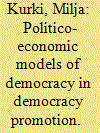

|
|
|
|
|
| Publication |
2014.
|
| Summary/Abstract |
This piece examines the curious nature of the conceptual foundations of current democracy promotion practice. I point out that while it is broadly accepted today that a liberal democratic politico-economic model should stand at the heart of democracy promotion, the scholarly literature on democracy-capitalism relationship stands in sharp contrast to this consensus in highlighting the contested nature of this relationship. Through a survey of some of the key theoretical texts on capitalism and democracy, and a brief empirical survey of politico-economic contours of current democracy promotion, this article highlights the poorly thought-through links between capitalism and democracy in current democracy promotion. It is argued here that un-reflexive conjoining of democracy and liberal capitalism and sidestepping of the plurality of nuanced positions on this relationship in scholarly literature is problematic and that revisiting the lines of contestation over the relationship between capitalism and democracy is deeply consequential for re-evaluating and revising democracy and market promotion policies in the current context of "dual crisis" facing democracy promoters today.
|
|
|
|
|
|
|
|
|
|
|
|
|
|
|
|
| 12 |
ID:
187531


|
|
|
|
|
| Summary/Abstract |
There is a multifaceted relational revolution afoot in International Relations (IR) and in the social sciences more widely. This article suggests, via engagement with varied forms of relational thought and practice in IR, but in particular via engagement with ‘relational cosmology’ associated with the ‘natural’ as well as the ‘social’ sciences, that there are important reasons for relational thought and practice in IR and around it to be more attentive to dialogues on relationality across natural and social sciences. If relational thought in IR has challenged the colonial and bifurcated ontologies of the field, relational cosmology too assists in shifting ‘modern’ understandings of science and the cosmos by facilitating engagement with situated knowledges and deep-going relationalities across ‘nature’ and ‘society’, ‘human’ and ‘non-human’ communities. Relational cosmology may be productive in joining, and perhaps even in facilitating, conversations across multiple relationalities emerging from different parts of the world and in different fields of inquiry, and yet – reflecting its relational and pluriversal orientations – it is not proposed here as a new ‘meta-‘ or ‘grand-’ narrative for relational theorising or IR.
|
|
|
|
|
|
|
|
|
|
|
|
|
|
|
|
|
|
|
|
|